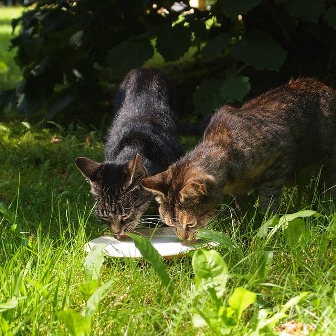Can Cats Drink Milk?
Can Cats Drink Milk?
For many of us, the first memories of cats are usually associated with images of cats drinking milk. Many of these images have spread around through cartoons or from folk tales. However, no matter what is the source of these images, they are not based on facts. Only kittens need milk, but solely from their mothers. There is no such kind of cats that veterinarians recommend cow’s milk as one of the necessary ingredients in their diet. Moreover, many cats can develop annoying complications after drinking milk, such as nausea, diarrhea, vomiting, and consequently, dehydration. Offering milk to a feral cat can be especially dangerous because their metabolism has never digested anything similar and can have a lot of trouble with its digestion. Only the cats that have been adjusted their metabolism to milk from their kittenhood can occasionally be offered a bowl of milk. But, to do this, we have to be sure that a cat will not react negatively. To understand why cats should not drink milk, we can consult the following excerpt from the article “Cats and Dairy: Get the Facts” from WebMD.com.
Can Cats Drink Milk?
“The only time animals are exposed to lactose is when they’re babies — in their mother’s milk,” Case says.
To digest lactose, a milk sugar, the human and feline digestive systems must contain the enzyme lactase. We have plenty of this enzyme in our systems at birth, and it helps us thrive on our mother’s milk.But as we grow up, it’s normal for people and cats to begin producing less lactase. Less lactase means less ability to digest lactose. The result may eventually be lactose intolerance.
When a lactose-intolerant cat drinks milk, the undigested lactose passes through the intestinal tract, drawing water with it, according to the Cornell University College of Veterinary Medicine’s web site. Bacteria in the colon also ferment the undigested sugars, producing volatile fatty acids.
All that activity might lead to an upset tummy and induce vomiting. But the most common symptom of lactose intolerance in cats is diarrhea, usually within eight to 12 hours, says Susan G. Wynn, DVM, CVA, CVCH, an animal nutritionist in Atlanta and co-author of the Manual of Natural Veterinary Medicine.
Many people are wondering why cow’s milk is not a good choice for cats because they are confused with cats’ affinity toward milk. Many cats, if offered milk, will drink it with a great pleasure. According to veterinarians, a fact that some cats enjoy thoroughly in drinking milk does not prove that milk is a good and healthy choice. It is especially the case if a cat gets diarrhea or begins vomiting 12 hours later. Maybe we can compare the cats’ affinity toward milk with human consumption of junk food or unhealthy desert. Experts do not mind giving a cat a little quantity of milk occasionally, but only as a trait. They strictly recommend avoiding milk as a meal replacement. A healthy meal for these little carnivores should contain a lot of protein and not lactose.











I will give 1 of my cats milk occasionally, as a drink & not a meal replacement. He’s had it for over 5yrs & never had any problems. The other cats only have cat/kitten milk, as well as a meal. There’s always water & biscuits for them.